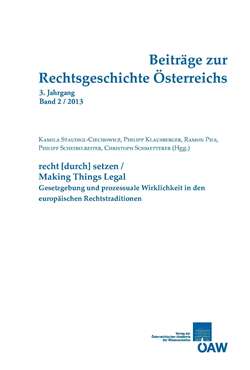
Beiträge zur Rechtsgeschichte Österreichs 2 / 2013, pp. 473-484, 2014/01/30
recht [durch] setzen - Making Things Legal.
Gesetzgebung und prozessuale Wirklichkeit in den europäischen Rechtstraditionen

Although compared to Modern Times taxes were considerably lower in Roman Antiquity, taxes were seen as a massive infringement of rights which needed additional justification. Raising taxes and contributions often caused turmoil and uprising among the population and immunity from taxes was not only seen as a great privilege, but also as a sign of freedom. At least partly, the unpopularity of taxes was owed to the publicans, private entrepreneurs who bought the collections from the state for a fixed price and were allowed to keep the rest. During the time of Augustus a private treasury of the imperial family was instituted and its agents undertook some of the functions of the old Republican treasury while at the same acquiring new financial sources like the inheritances of the convicted, sometimes with ruthless methods.